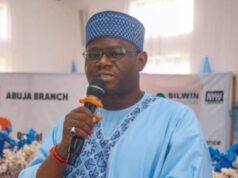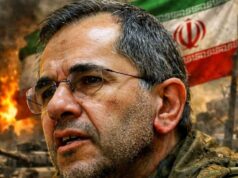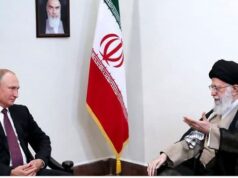 If voting in the February 16 presidential election were to be influenced by candidates’ performances in the January 19 presidential debate, then both President Muhammadu Buhari of the All Progressives Congress (APC) and his strongest challenger, Alhaji Atiku Abubakar of the Peoples Democratic Party (PDP), would not stand a chance of winning.
If voting in the February 16 presidential election were to be influenced by candidates’ performances in the January 19 presidential debate, then both President Muhammadu Buhari of the All Progressives Congress (APC) and his strongest challenger, Alhaji Atiku Abubakar of the Peoples Democratic Party (PDP), would not stand a chance of winning.
Both Buhari and Atiku did not participate in the debate. They left the trio of Professor Kingsley Moghalu, Mrs. Oby Ezekwesili and Mr. Fela Durotoye to slug it out with one another. But fortunately for both men, as well as presidential candidates of other parties that were purportedly rigged out of the much-publicised debate, presidential debate has never counted for anything in the determination of the outcomes of presidential elections in the current Fourth Republic.
Validations: I cannot remember General Olusegun Obasanjo, as presidential candidate of the PDP in the 1999 election, debate with the presidential candidate of the Alliance for Democracy and All Peoples Party (AD/APP), Chief Olu Falae. That did not stop Obasanjo from winning the election. In 2003, Obasanjo and Muhammadu Buhari who was the APP presidential candidate did not debate; Obasanjo went ahead to win the election.
In 2007, Alhaji Umaru Yar’Adua, who was the PDP candidate, did not debate with Buhari, who was APP’s candidate; yet Yar’Adua won the election. In 2011, President Goodluck Jonathan of the PDP did not participate in the debate with Buhari, who was the presidential candidate of the Congress for Progressive Change (CPC); yet Jonathan won the election. In 2015, Buhari did not participate in the presidential debate with Jonathan. That did not stop Buhari from winning the election.
These historical developments inevitably question the relevance of debates in Nigeria’s presidential system of government and in the contestation for power when those who shunned the debates, in the past, ended up winning their respective elections. Is it therefore surprising that presidential candidates have continued to treat with disdain what should have been a serious issue, knowing full well that non-participation has always been rewarded with victory?
In advanced democracies, such sense of superciliousness will not go unnoticed and unpunished. It is sad that Nigeria is yet to get to that level where those who seek to govern the people are taken through the mills of public interrogation and compelled to stake their reputations and be accountable to the commitments they make to get voters’ support in furtherance of the social contract.
We are at an intersection where responsible and good actions should be deliberately encouraged and taken to elevate presidential debates to the high pedestal of shared value system that defines our democratic process and who we are as stakeholders and determiners of political choices. Nigerians should be defined by their commitment and sense of entitlement to good governance and play a strategic, direct role, not through a clique of political elite, in the choice of those who occupy elective offices.
The place of good education is important in the expected political renaissance where those who want to rule must obligatorily appeal to the people’s sensibilities for critical support. That is the kind of political enlightenment that has hallmarked voting patterns and behaviours in advanced democracies. The fact is that Nigerians have yet to get to that point. We owe it a duty to ourselves and future generations to pile reasonable pressure on the system and the operators to bow to popular will; that is, if we are sincerely desirous of changing the status quo.
Until we find a common drift along this trajectory, democracy in this matrix will continue to suffer from a discounted political and electoral value system, with manifest concerns over the quality and competence of leadership thrown up by interactions in the milieu of the political economy. Since 1999, we have had presidents that were not sufficiently interrogated by the people before they stepped into office. Their emergence had been on some personal reputations, which had consistently not aligned or tallied with performances in the long run.
Obasanjo was in 1999 foisted on Nigerians, by a cabal of northern military generals and leaders. There were reasons to believe that Nigerians would have preferred Chief Falae of the AD/APP. The Obasanjo presidency had been predetermined such that in the PDP primary, the cabal ensured that he defeated the more politically-experienced and sophisticated Alex Ekwueme to secure the party’s presidential ticket.
In 2003, it was not a question of whether or not Obasanjo had performed to deserve a second term; he simply deployed the machinery of government in retaining power. In 2007, Obasanjo had, single-handed, imposed Umaru Musa Yar’Adua as his successor in office after his third term presidential gambit had failed. Nigerians did not have the opportunity of interrogating the capacity and fitness of Yar’Adua. His presidency was a fait accompli.
Jonathan, who succeeded Yar’Adua in 2010, following his demise, was a constitutional creation. When the time came in 2011 to renew his mandate, he rode on the crest of some primordial political sentiments, including the promotion of the idea of accommodating the minority in the heritage of presidential power.
Buhari had ridden to power in 2015, on his reputation. Extreme political frenzy and partisanship, especially by his opposition party that ramped up support for him, did not create the opportunities for critical interrogation of his competence and capacity. His handlers did not allow him to participate in the debate, leaving Jonathan on the stage talking to himself and Nigerians.
Another presidential debate, the most significant in the series of debates, given the status and, perhaps, respectability of the organiser and the platform (BON/NEDG) has been evaded. This time round, Buhari’s absence at the debate had caused Atiku who was at the venue of the debate to withdraw his participation. It is moot whether or not the decision by Atiku to pull out was prudent and strategic. The fact remains that both of them did not talk to Nigerians on that particular platform.
Certainly, the development speaks to the continuous retreat of the ideal of citizens’ critical place and participation in the democratic process of choosing their president. If the people were the determiners of victory through their voting power – knowing full well that their votes would always count – no presidential candidate would shun such an important opportunity to debate.
Presidential debates in advanced democracies are not mere rituals. They are significant engagements. For instance, they are relevant to the degree that they enable citizens to assess the mental stature and preparedness of candidates who want the office of president. To shun the BON/NEDG debate, as Buhari and Atiku did, discounts the relevance of the platform.
However, it must be stated that the inability of the BON/NEDG to accommodate all the presidential candidates had also, from the outset of the process, cast them in the mold of compromised and partial organisers. Those who were not allowed to participate are justified to conclude that they were deliberately rigged out in furtherance of some delicate agenda. Nigerians have noted the limitation of the parties “rigged out” by the organisers.
In fact, these are some of the developments that have greatly diminished the presidential debate and aggravated the perception about the irrelevance of the exercise. In rounding off, I believe that Buhari and Atiku should have been at the event. This seeming condescension by candidates, who see themselves as, perhaps, indispensable in the matrix, must be forestalled in 2023.
The process of legalizing and compelling participation in presidential debates through an Act of National Assembly must begin as soon as the 9th National Assembly is inaugurated in June this year. The Act should provide a general framework that will set out criteria for organisation of debates such that the exercise is elevated in the ambience of electoral choices henceforth.
- Ojeifo, journalist and analyst, contributed this piece via ojwonderngr@yahoo.com






